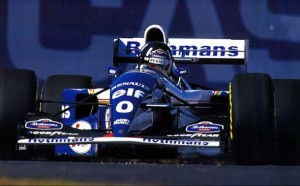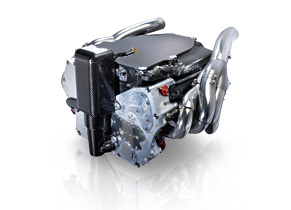The number 0
 Every racing car in the Formula One World Championship has a number painted on it. These are assigned depending on the team’s final standing in the previous year’s Constructors’ Championship. The team whose driver won the Drivers’ Championship gets the numbers 1 and 2 while the rest of the numbers are assigned in the teams’ finishing order. Within the team the senior driver generally has the lower number.
Every racing car in the Formula One World Championship has a number painted on it. These are assigned depending on the team’s final standing in the previous year’s Constructors’ Championship. The team whose driver won the Drivers’ Championship gets the numbers 1 and 2 while the rest of the numbers are assigned in the teams’ finishing order. Within the team the senior driver generally has the lower number.
The teams’ numbers also denote their pit garage position with the lower numbers having access to the biggest garages and those at the back of the grid having to make do with much smaller facilities.
On Monday the FIA released a revised drivers list for the 2009 Championship with driver number changes affecting three teams. Honda has now been officially renamed as Brawn GP and, as befits their ‘new team’ status, will be given the final two numbers and the last garage in the pits. Sebastien Bourdais becomes the senior driver at Toro Rosso and so takes over the number 11 leaving number 12 to his rookie team mate Sebastien Buemi. Over at Ferrari Felipe Massa, who outperformed Kimi Raikkonen last year, swaps places with him and gets the number 3.
You may have noticed in the video I posted the other week that Damon Hill was driving a Williams with the number 0 on it. How did that happen?
When Nigel Mansell, the reigning World Champion, left Formula One to race in the US CART series in 1993 Williams promoted Damon Hill from test driver to a race seat alongside Alain Prost and, as Mansell was not racing in Formula One, Williams were assigned the numbers 0 and 2. Prost, the senior driver, took number 2 and so Hill became only the second man in Formula One history to race with the number 0; the first was Jody Scheckter in 1973.
Here is the full list of constructors and drivers for the 2009 FIA Formula One World Championship. You will notice there is no number 13, for obvious superstitious reasons.
Update: 2009-03-26: The FIA have revised the numbers yet again. It seems Force India were annoyed they had taken all their promotional pictures with their expected numbers of 20 and 21 so they will keep them this year and Brawn GP will get 22 and 23. There will be no 18 or 19 cars.
| N° | DRIVER | TEAM | CONSTRUCTOR |
| 1 | Lewis HAMILTON (GB) | VODAFONE McLAREN MERCEDES | McLAREN MERCEDES |
| 2 | Heikki KOVALAINEN (FIN) | VODAFONE McLAREN MERCEDES | McLAREN MERCEDES |
| 3 | Felipe MASSA (BRA) * | SCUDERIA FERRARI MARLBORO | FERRARI |
| 4 | Kimi RÄIKKÖNEN (FIN) * | SCUDERIA FERRARI MARLBORO | FERRARI |
| 5 | Robert KUBICA (PL) | BMW SAUBER F1 TEAM | BMW SAUBER |
| 6 | Nick HEIDFELD (D) | BMW SAUBER F1 TEAM | BMW SAUBER |
| 7 | Fernando ALONSO (E) | ING RENAULT F1 TEAM | RENAULT |
| 8 | Nelson PIQUET (BR) | ING RENAULT F1 TEAM | RENAULT |
| 9 | Jarno TRULLI (I) | PANASONIC TOYOTA RACING | TOYOTA |
| 10 | Timo GLOCK (D) | PANASONIC TOYOTA RACING | TOYOTA |
| 11 | Sébastien BOURDAIS (F) * | SCUDERIA TORO ROSSO | STR FERRARI |
| 12 | Sébastien BUEMI (CH) * | SCUDERIA TORO ROSSO | STR FERRARI |
| 14 | Mark WEBBER (AUS) | RED BULL RACING | RBR RENAULT |
| 15 | Sebastian VETTEL (D) | RED BULL RACING | RBR RENAULT |
| 16 | Nico ROSBERG (D) | AT&T WILLIAMS | WILLIAMS TOYOTA |
| 17 | Kazuki NAKAJIMA (J) | AT&T WILLIAMS | WILLIAMS TOYOTA |
| 20 | Adrian SUTIL (D) | FORCE INDIA F1 TEAM | FORCE INDIA MERCEDES |
| 21 | Giancarlo FISICHELLA (I) | FORCE INDIA F1 TEAM | FORCE INDIA MERCEDES |
| 22 | Jenson BUTTON (GB) | BRAWN GP FORMULA ONE TEAM | BRAWN MERCEDES |
| 23 | Rubens BARRICHELLO (BR) | BRAWN GP FORMULA ONE TEAM | BRAWN MERCEDES |
* Driver number change requested by the team and approved by the FIA.
 Formula One is a sport with so many rules and regulations that even the people who make them don’t understand them all.
Formula One is a sport with so many rules and regulations that even the people who make them don’t understand them all. I’ve said
I’ve said  Bernie Ecclestone thinks the
Bernie Ecclestone thinks the 